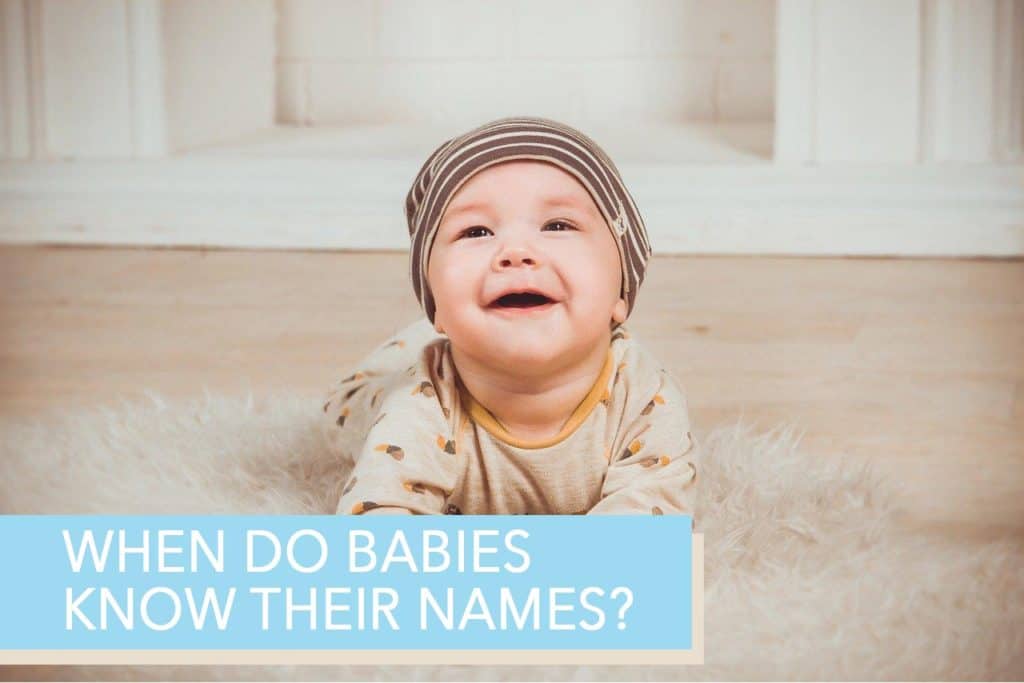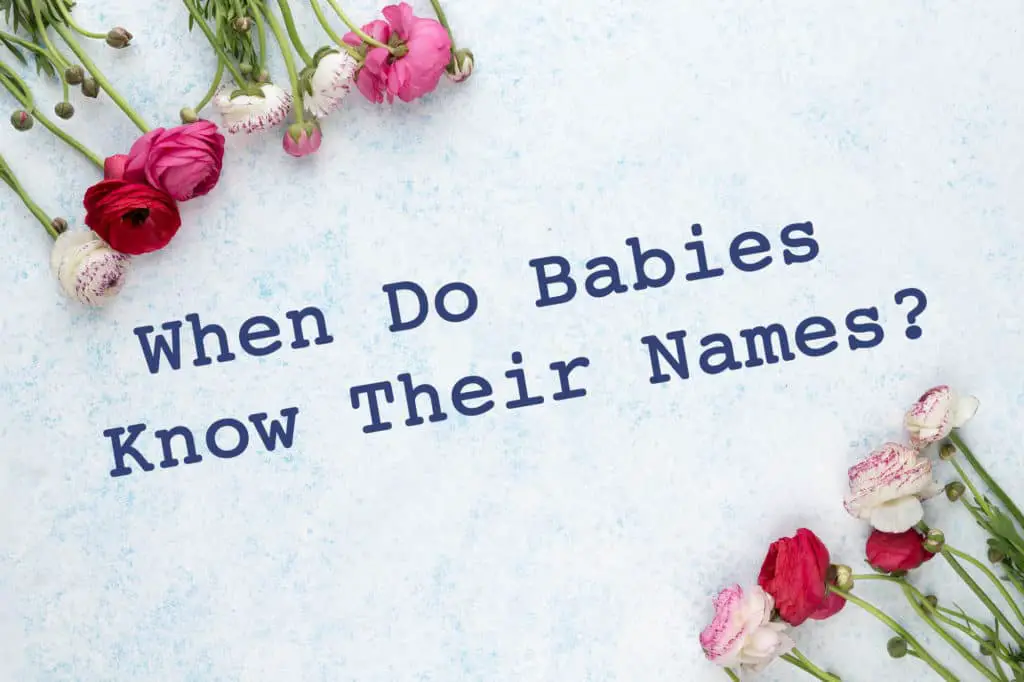For new parents, everything their babies do – from that first gas-related “smile” to their first steps – brings tremendous joy. Sometimes it can be difficult to know when your baby should know and respond to their name, and delays can be worrying for new parents.
Most babies know their names between 6 and 7 months of age. They learn to speak their names when they are between 10 and 12 months old.
Of all your baby’s developmental milestones, language development milestones are the most fun to observe, with their cute baby pronunciations and mistaken associations. A baby’s response to hearing his name, and finally saying it, are especially meaningful—and we’ll discuss when that should happen, reasons it could be delayed, and what to do if that is the case.

When Do Babies Recognize Their Name?
If your newborn turns to you at the sound of your voice during the first few months of his life, it is most likely because he hears the sound of your voice, not because he recognizes his name! According to the CDC’s developmental milestones guide, most babies will respond to their own name by the time they are six months old.
Rochelle Newman, Chair of the University of Maryland’s Department of Hearing & Speech Sciences, says:
“A lot of recent focus has been on simply talking more to your child — but how you talk to your child matters. It isn’t just about the number of words.”
Most parents are familiar with the theory that the more they speak to their baby, the quicker the baby will develop communication skills. Research shows that it isn’t simply talking to babies that helps them get there. Repeating words with emphasis can help a baby comprehend the word.
By six months, babies have developed the ability to associate certain words with certain objects because of the repetitive communication from others. For example, if you repeatedly point to a ball and say “ball,” over time, your baby will begin to understand that the round, colorful object you both play with is called a “ball”.
Similarly, if like most doting parents, you frequently use your baby’s name when you interact with him in the first months of his life, he will begin to associate his name with himself.
When Do Babies Respond to Their Name?
Most babies will respond to their name by the time they are six or seven months old.
Here are some easy tips to help you teach your baby to respond to his name:
- Have frequent conversations with your baby.
- From the time he is a newborn, use your baby’s name – not nicknames – frequently when you address him.
- Ask others to use the baby’s name while talking to him too.
- For better name recognition keep the calling session short and crisp and take small breaks between different occurrences of name calls.
- Initially practice calling out your baby’s name to him in a setting with few distractions. Over time, you can do this in a setting with distractions.
- Call his name until he turns towards you.
- Reward him for positive reinforcement when he turns to respond to you.
Baby Doesn’t Respond to Name
All parents should remember that developmental milestones are an indicator of when most babies do certain things. When a baby reaches a milestone ahead of schedule, it’s not a cause for worry. Similarly, if your baby does not hit a developmental milestone when expected, it may simply mean that he is taking some more time to get there. Even so, it never hurts to discuss your concerns with your pediatrician. Dr. Aparna S. Nadig , from the University of California Davis MIND Institute, says:
, from the University of California Davis MIND Institute, says:
“Failure to respond to name at the well-child 1-year checkup may be a useful indicator of children who would benefit from a more thorough developmental assessment.”
When a baby doesn’t respond to his name, it may be an indication of communication and cognitive delays, hearing problems, and perhaps, even autism. Even so, not all one-year olds who fail to respond to their names develop autism. Some one-year-olds who do respond to their names may still develop autism later in life, too. It isn’t a perfect symptom.
What to Do If Your Baby Doesn’t Respond to His Name?
According to speech pathologists you can try to teach your baby to respond to his name. If your baby doesn’t respond to his name, try teaching him to do so in an isolated setting. Take him to a quiet place like a room with few toys. When he turns away from you to look at something else, call his name. If he doesn’t respond, do so again, louder and with more of a commotion like waving your arms. If he does respond, give him verbal positive reinforcement and a reward.
you can try to teach your baby to respond to his name. If your baby doesn’t respond to his name, try teaching him to do so in an isolated setting. Take him to a quiet place like a room with few toys. When he turns away from you to look at something else, call his name. If he doesn’t respond, do so again, louder and with more of a commotion like waving your arms. If he does respond, give him verbal positive reinforcement and a reward.
When your baby starts to respond to his name in an isolated setting about 80% of the time, practice this skill in the same way in a more structured setting where there are more distractions (e.g. more toys). It may be harder for your baby to respond now that there are more distractions so give him a moment to play between each time you call his name.
Finally, practice in an unstructured setting. Don’t be discouraged if your baby doesn’t respond perfectly every time! Even healthy babies who have had no difficulty responding to their names sometimes encounter that problem when immersed in an activity that entrances them.
But if you have no success or very little success even in less distracting settings, consult your pediatrician. Most likely, this is just one area in which your child’s development is delayed. But good monitoring and getting it on your pediatrician’s radar can be helpful in learning how to help your child.

When Do Babies Learn to Say Their Name?
Most babies begin their cute babbling between 4 and 6 months. Between 10 to 12 months, most babies will begin to say a few words. This may include saying their names.
Having conversations and repeating some words helped your baby to recognize those words and their meaning. According to Baby Center, these same things help your baby to parrot a few words – including his name – back to you!
These early words, spoken mostly in phrases, without grammar, are perhaps the most fun conversations you will have with your baby.
What to Do If Your Baby Doesn’t Say His Name
Many parents expect their babies to be speaking by the time they are one year old. However, recent surveys suggest that approximately 25% of babies have not yet said their first words by that age. So, if your baby has not said his name by then, it may not be cause for concern. He may just be taking his time to give you the satisfaction. Monitor the situation and consult with your pediatrician, with the understanding that some babies may take up to 14 months to say any words, including their names. According to Parenting Science:
said their first words by that age. So, if your baby has not said his name by then, it may not be cause for concern. He may just be taking his time to give you the satisfaction. Monitor the situation and consult with your pediatrician, with the understanding that some babies may take up to 14 months to say any words, including their names. According to Parenting Science:
Researchers emphasize that it’s normal for babies to vary quite a bit in the timing of their speech milestones.
When Do Babies Respond to their Name?
Most babies will know their names by 6 to 9 months, respond to them shortly after recognition sets in and begin to say their names by the time they are a year old. If your baby falls short of these developmental milestones, remember that these milestones are a guideline. Not every child reaches them by the stated time. You may need to help your child learn how to respond. Or, you may wish to consult your pediatrician.


